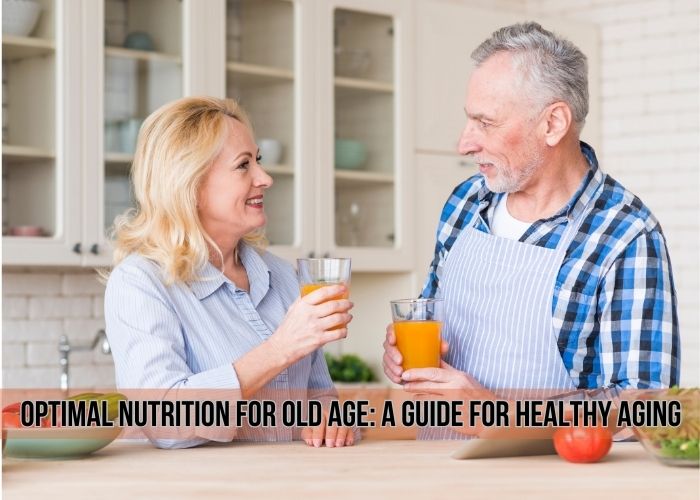“The food you eat can be either the safest and most powerful form of medicine or the slowest form of poison.” – Ann Wigmore (Holistic Health Practitioner)
As rightly pointed out, what we eat becomes super important for our health and well-being. So, we really need to focus on eating healthy stuff to stay in good shape as we age.
As we grow older, taking care of ourselves becomes even more important, and that includes paying attention to what we eat. That’s what “healthy eating when you’re older” is all about! It’s about making smart choices when it comes to our food to stay strong, active, and happy as we age.
You see, our bodies change as we get older, and so do our nutritional needs. It’s not about following the latest diet trends; it’s about nourishing ourselves with a balanced diet that suits our age and lifestyle. Eating well can help us ward off age-related health issues, keep our energy levels up, and even boost our mental clarity.
It’s not about depriving ourselves or giving up the foods we love. Instead, it’s about finding a good balance and making mindful choices. That’s exactly where geriatric nutrition comes into the picture. With the help of a clinical nutrition specialist, you can get a holistic diet plan for your wellbeing.
So, let’s understand the benefits of healthy eating for older people and the types of food that must be included.
Benefits of Healthy Eating for Older People:
WHO says – “A healthy diet helps to protect against malnutrition in all its forms, as well as non-communicable diseases (NCDs), including diabetes, heart disease, stroke and cancer.”
So, good nutrition comes with plenty of benefits. You will not only enjoy a high quality of life but also stay away from diseases. In this context, let’s explore some of the top benefits of good nutrition for geriatric patients.
-
Enhanced Cognitive Function: A balanced and nutritious diet supports cognitive health in older individuals, promoting better memory retention, improved focus, and reduced risk of age-related cognitive decline.
-
Cardiovascular Health: Adopting a healthy eating pattern, rich in whole grains, fruits, vegetables, and lean proteins, helps maintain cardiovascular health by reducing the risk of heart disease and hypertension.
-
Bone Health and Fracture Prevention: Adequate intake of calcium and vitamin D through a well-balanced diet, along with regular physical activity, contributes to stronger bones, reducing the risk of fractures and osteoporosis.
-
Sustained Energy Levels: Proper nutrition provides a steady source of energy for older adults, enabling them to maintain an active lifestyle and engage in daily activities with vitality.
-
Strengthened Immune System: Consuming a variety of nutrient-dense foods, such as fruits, vegetables, and whole grains, bolsters the immune system, making older individuals more resilient to infections and illnesses.
-
Skin Health and Anti-Aging Benefits: A diet rich in antioxidants, healthy fats, and essential nutrients contributes to improved skin health, providing anti-aging benefits and promoting a more youthful appearance.
To maximize the benefits and ensure tailored nutritional guidance, consulting with a specialized professional, such as a geriatric dietitian, is invaluable. A geriatric dietitian possesses the expertise to design personalized dietary plans, empowering older adults to lead fulfilling lives with optimal health. So, if you want to make a consultation with the best dietitian in Delhi, Kolkata, Bangalore and Mumbai, get in touch with Food and Wellness!
Tips on Food Choices for Older People to Maintain a Healthy Diet
The WHO recommends that adults consume at least 400 g of fruit and vegetables per day, excluding starchy roots; limit their intake of free sugars to less than 10% of total energy intake; and reduce their salt intake to less than 5 g per day.
With factors like slower metabolism and changes in the digestive system, food preferences, and appetite, choosing the right foods becomes crucial. Healthy options for older individuals include nutrient-rich fruits, vegetables, whole grains, lean proteins, and foods high in calcium and vitamin D to support bone health.
Consulting a clinical nutrition and dietetics specialist can help create a personalized and nourishing meal plan. Having said that, here are some of the best tips on foods for geriatric patients that can help them maintain a healthy diet.
-
Eat Foods Packed with Good Stuff: As we get older, our calorie needs decrease, but our bodies still crave essential nutrients. So, it’s crucial for older adults to munch on nutrient-rich foods to get the vitamins, minerals, carbs, fats, and proteins they need. Think beans, lentils, fruits, veggies, whole grains, nuts, seeds, lean proteins, and low-fat dairy. But watch out for those calorie-loaded, nutrient-poor treats like sugary desserts and greasy junk food – better to avoid them!
-
Fiber is Your Friend: To keep the tummy happy and the digestive system humming, old age people should make friends with fiber! Foods rich in fiber help prevent constipation and keep cholesterol in check. Load up on nuts, seeds, beans, lentils, fruits, vegetables, and oats.
-
Choose Smart Convenience Foods: Opt for nutrient-packed choices that are easy to prepare. For instance, you can choose instant oatmeal, low-sodium canned veggies, canned meats and fish, baked beans, and frozen unsweetened or low-sugar fruit. Just check those labels for low saturated fat, salt, and added sugar, and higher vitamin, mineral, and fiber content.
-
Get a Supplement Boost: Sometimes, it’s hard to get all the nutrients from food alone, especially with dietary restrictions. In those cases, older adults can consult their clinical nutrition specialist about vitamin or mineral supplements like magnesium, vitamin B-6, B-12, and vitamin D. These goodies may not be absorbed as well by older bodies, so a little boost can do wonders.
-
Stay Hydrated, Stay Healthy: Sipping on water and other fluids is vital for older folks. As we age, our bodies lose some water, leading to dehydration. And that’s no good – it can cause all sorts of trouble like confusion and constipation. So, make sure to drink plenty of water, fluids, and fruit juice to stay fresh and hydrated!
To ensure a personalized and effective dietary plan, seeking guidance from a qualified professional like a geriatric dietitian is invaluable. Adopting a healthy lifestyle with the support of a professional can help you enjoy a vibrant and fulfilling life, brimming with good health and happiness. So, get in touch with the best dietitian and nutritionist for your needs.




